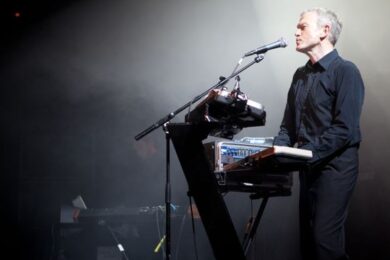‘Shatterproof’, the track that opens John Foxx & The Maths’ 2011 debut LP Interplay, lurks around the brick arches of Cargo, mischievous and louche. In his black stage uniform (zip-up top and trousers) John Foxx gesticulates, silver haired and suave, in front of retro-futurist visuals. Benge, buff in a Maths shirt, has the look of a 70s porn soundtrack composer who occasionally likes to join in with the action. He does a mean lower lip bite as he stands thwacking drum pads and triggers. Hannah Peel, the third Mathematician present tonight, has her hair up and sports a sharp black jacket, 70s TV assassin style, as she twists around racks of synths and violin.
This excellent run of John Foxx and the Maths collaborations, records and gigs has been characterised by the sheer deft artistry which it has all been put together. Though Cargo – a venue that always suits the electronic artist – quakes under the rich bass and density of the drums, there’s so much room for the songs to breathe. They’re artfully arranged too, with plenty of space for Peel’s mic’d up violin to move and add new layers of more organic sound.
This is why Foxx’s music never feels synthetic or dated, as is demonstrated (aptly enough) by ‘Evergreen’, which rates as one of the finest songs he has ever written. During it, the PA suddenly rises to a volume we never hear in London these days.
Indeed, the robust fullness of the John Foxx & The Maths material is nicely shown in juxtaposition to the older songs. So on ‘No-One Driving’, as nuclear imagery flashes across the screen at the back of the stage, the melody feels thinner, a Bakelite and chrome prototype for what he’s capable of now.
Indeed, though Metamatic-era tracks like ‘Burning Car’ might at first go down best with the audience – Foxx purses his lips and does and a flick of the shoulders as it ends, which must be the synth equivalent of rocking out with your foot on the amp – the arch, fashion-show-in-a-power-station raunch of 2011’s ‘Catwalk’ is, to these ears, the better. Yet Foxx is always adaptable – its a more streamlined, well-lit version of ‘Underpass’ that is played tonight.
Interesting too is the black-and-white 1950s footage that accompanies ‘Plaza’ – minimal, functional office spaces, concrete post war architecture, waiting rooms where the chairs are art. These images still look like the future, perhaps because the post war period was the last time we had buildings that looked modern rather than post modern constructions of Lego. Foxx’s music, written under the threat of Mutually Assured Destruction one or two decades later, dealt with the insecurity of such things, how it might be swept away by a few, or a few thousand, mushroom clouds. Today, those images have a different resonance; a sense of sadness – the Cold War might be over, but that post WWII promise of clean lines and better living was never truly realised, and some of its greatest achievements, most prominently the NHS, are now being undone.
This does add a curiously political dimension to his music – indeed a sarcastic dedication of ‘Shatterproof’ to bankers is about all that Foxx says tonight. Yet it’s to his credit that he now (see this year’s The Shape Of Things LP) delves further into the strength of self, of the structure and matter of interpersonal communications. Such is progress – the lasers that pierce the Cargo dry ice tonight would, when these older tracks were written, have surely required housing in laboratories.
After ‘No One Driving’, ‘Evidence’ is bracingly heavy in its beats, but with sawing violin noise and a soaring vocal refrain. ‘Running Man’ is so loud it’s Biblical sci-fi, a titanium Goliath yomping back to get revenge on David. ‘Summerland’ is a stunt plane over the desert smooth exhilaration; in ‘Walk’ a violin sounds like a guitar before sounding like violin again. It’s all majestic stuff.
Every day at the Quietus we get sent Korg plug-in Fisher Price cold wave by earnest cheek-sucking young things who dream of being Belgians with a ready access to cheap speed. Their depressing retro minimalism forgets that early synth music was formed out of necessity. With his melodic chops, vivid lyrical imagination, and indecently able collaborators, John Foxx’s electronic maximalism by sounds futurist and, perhaps more importantly, glows as a warm human soul. As the comforting burbles of ‘The Good Shadow’ have it, "I will always be your shadow… I will always keep you safe" and on the screen, the layers of projections show hands clasping over synths over a freeway. Appropriating the nursery rhyme ‘Twinkle Twinkly Little Star’, it offers solace against the cold threats of technology and the modern out of control.
At the end, there’s one of those lovely moments when the applause doesn’t stop, and you sense that a lot of people who came here on a retro tip have been moved by something unexpectedly of the moment. "A new kind of man", indeed.



